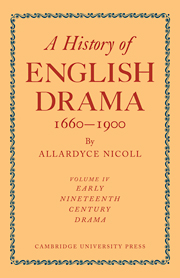Book contents
- Frontmatter
- PREFACE
- Contents
- PART I
- Chapter One THE THEATRE
- Chapter Two THE DRAMATIC CONDITIONS OF THE AGE
- Chapter Three THE ILLEGITIMATE DRAMA
- Chapter Four THE LEGITIMATE DRAMA
- Chapter Five THE STILL-BORN DRAMA
- Chapter Six CONCLUSION
- SUPPLEMENTARY NOTES
- Appendix A THE THEATRES, 1800–1850
- PART II
- SUPPLEMENTARY NÓTES TO THE HAND-LIST OF PLAYS 1800–1850
- INDEX OF PERSONS AND SUBJECTS
Chapter Five - THE STILL-BORN DRAMA
Published online by Cambridge University Press: 07 October 2011
- Frontmatter
- PREFACE
- Contents
- PART I
- Chapter One THE THEATRE
- Chapter Two THE DRAMATIC CONDITIONS OF THE AGE
- Chapter Three THE ILLEGITIMATE DRAMA
- Chapter Four THE LEGITIMATE DRAMA
- Chapter Five THE STILL-BORN DRAMA
- Chapter Six CONCLUSION
- SUPPLEMENTARY NOTES
- Appendix A THE THEATRES, 1800–1850
- PART II
- SUPPLEMENTARY NÓTES TO THE HAND-LIST OF PLAYS 1800–1850
- INDEX OF PERSONS AND SUBJECTS
Summary
Tragedies
It has been remarked above that no sure distinction is to be made in this time between the acted and the unacted drama; some dramatists such as Talfourd penned their plays with no thought of the stage and saw those plays presented on the boards; others wrote with fond theatrical ambitions and had to condescend to the printing press for making known their wares. If, however, there is no certain classification to be made along these lines, the great fact remains that this period abounds in dramas of a purely “poetic” kind which either were never performed in their own times or have never, even to this day, found actors and actresses to interpret them. There is, therefore, an insistent necessity for considering these dramas as a class, and for endeavouring to estimate their worth as dramas. It is not my purpose here to deal with such productions as the Prometheus Unbound of Shelley, which obviously makes no pretence towards theatrical form, but, even leaving aside such works, we find a great mass of tragedies and of comedies, written by some of our most famous poets and prose-writers, which stand completely apart from the regular fare of the playhouses. The question which is raised, therefore, in this present chapter is the same as that raised elsewhere in this book. We have to consider whether the theatres or the poets were at fault that so few of their dramas were produced, and the question here must be answered, not along the lines of generalisation, but from concrete examples.
- Type
- Chapter
- Information
- A History of English Drama 1660-1900 , pp. 191 - 210Publisher: Cambridge University PressPrint publication year: 1955



